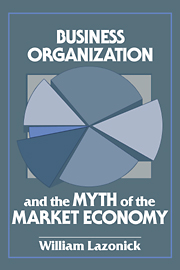Book contents
- Frontmatter
- Contents
- List of figures
- Acknowledgments
- Introduction: the wealth of three nations
- PART I Economic institutions and economic performance
- PART II Intellectual foundations and intellectual constraints
- 4 The theory and history of capitalist development
- 5 The making of the market mentality
- PART III The “marvels of the market” versus the “visible hand”
- PART IV Overcoming intellectual constraints
- Index
4 - The theory and history of capitalist development
Published online by Cambridge University Press: 01 April 2010
- Frontmatter
- Contents
- List of figures
- Acknowledgments
- Introduction: the wealth of three nations
- PART I Economic institutions and economic performance
- PART II Intellectual foundations and intellectual constraints
- 4 The theory and history of capitalist development
- 5 The making of the market mentality
- PART III The “marvels of the market” versus the “visible hand”
- PART IV Overcoming intellectual constraints
- Index
Summary
Economics and history
Writing in the mid-twentieth century, toward the end of a long academic career, Joseph Schumpeter advised that “if, starting my work in economics afresh, I were told that I could study only one of [the fundamental fields of economic analysis: economic history, statistics, or theory] but could have my choice, it would be economic history that I should choose.”
And this, on three grounds:
First, the subject matter of economics is essentially a unique process in historic time. Nobody can hope to understand the economic phenomena of any, including the present, epoch who has not an adequate command of historical facts and an adequate amount of historical sense or of what may be described as historical experience.
Second, the historical report cannot be purely economic but must inevitably reflect also “institutional” facts that are not purely economic: therefore it affords the best method for understanding how economic and non-economic facts are related to one another and how the various social sciences should be related to one another.
Third, it is, I believe, the fact that most of the fundamental errors currently committed in economic analysis are due to the lack of historical experience more often than to any other shortcoming of the economist's equipment.
Schumpeter had started his career some four decades earlier by writing The Theory of Economic Development, an abstract theoretical investigation that sought to deduce a theory to comprehend the vast expansion of productive capabilities that had occurred in national economies such as those of Britain, Germany, and the United States.
- Type
- Chapter
- Information
- Business Organization and the Myth of the Market Economy , pp. 115 - 146Publisher: Cambridge University PressPrint publication year: 1992



